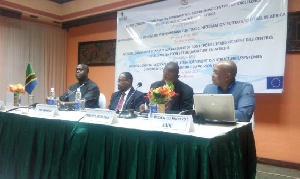The African Union Inter-African Bureau for Animal Resources (AU-IBAR) is considering the establishment of centers of excellence for fisheries and aquaculture across the continent.
An expert consultative meeting on a roadmap for establishing Africa centres of excellence for fisheries and aquaculture and on strengthening fish trade information systems is being held in Zanzibar, Tanzania.
Participants include the member states, the Regional economic communities, regional fisheries bodies, development partners and experts. Opening the workshop in Zanzibar on Monday, the Minister of Agriculture, Natural Resources, Livestock and Fisheries, Zanzibar, Dr. Hamad Rashid Mohammed stressed on the need to turn around Africa’s fortunes in the area of fisheries governance and management.
He said “enough of the exploitation of the continent’s marine resources by other people than ourselves. Tanzania has entered into trade agreements with about 86 vessels but none of them is owned by an African country.”
He also suggested financial institutions that front for Agric financing must consider financing the fisheries sector which is usually ignored. Africa continues to suffer from a paucity of qualified personnel both at senior management levels and intermediate levels.
This is partly as a result of limited or weak institutions for training or research that would inform the sector’s governance.
The limited numbers of professional institutions, especially for intermediate staff, have serious implications for employment of African in both fishing and aquaculture industry. At the senior level, the near derelict institutions for research or training of high-level managers is a recipe for poor governance and lack of informed decision making.
In his opening remarks the director of AU-IBAR Dr. Simplice Nuoala was emphatic, the center would address the challenges of poor fisheries governance.
“The objective of this workshop is to develop a realistic roadmap for establishing the centres of excellence for strengthening the capacity of the continent for improved management and development of its fisheries and aquaculture resources to ensure increased sustainable contribution to food security, poverty alleviation and economic growth” he indicated.
The activities are as a result of recommendations from the 2014 Joint Ministerial Conferences in Addis Ababa, Ethiopia that charged the African Union to facilitate the establishment of Centres of Excellence in Fisheries and aquaculture to enhance capacity building in the sector for its sustained development.
Similarly the declaration of the Heads of States and Governments in 2014 in Malabo, Equatorial Guinea called for action to strengthen intra-African in Agricultural Commodity and services including a fish trade for increased wealth creation and food security.
The meeting, therefore, seeks to share experiences, lessons and knowledge on appropriate mechanism or roadmap for establishing African centres of excellence in fisheries and aquaculture that would stand the test of time.
It is also to reach a consensus on how to strengthen functional and ensure sustainability of fish trade information systems that would be of invaluable services in promoting fish trade and market information at regional and sub-regional levels.
Regional News of Thursday, 30 June 2016
Source: 3news.com

















